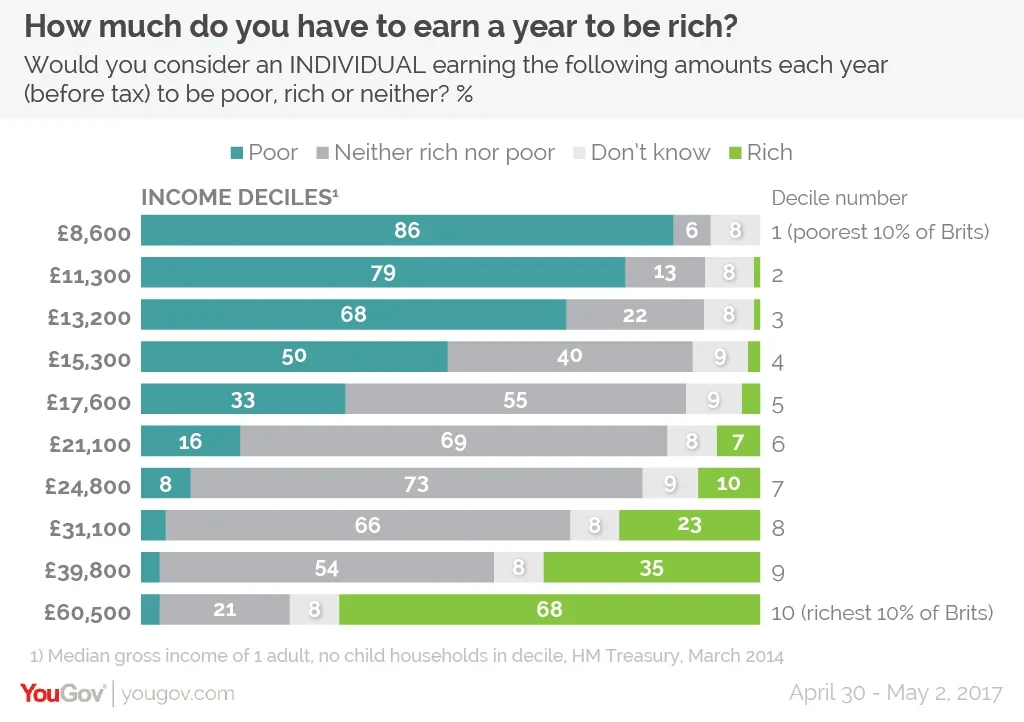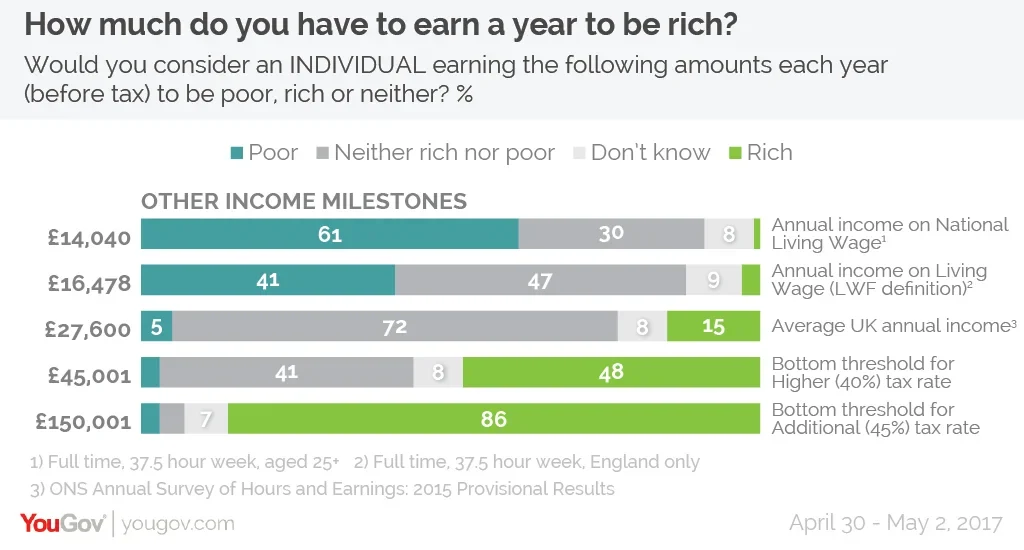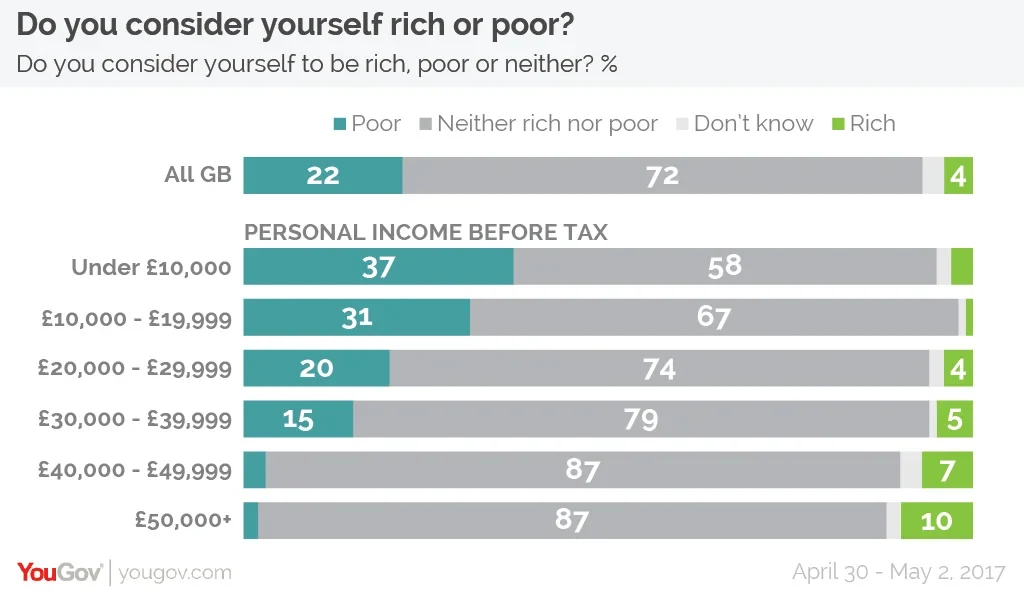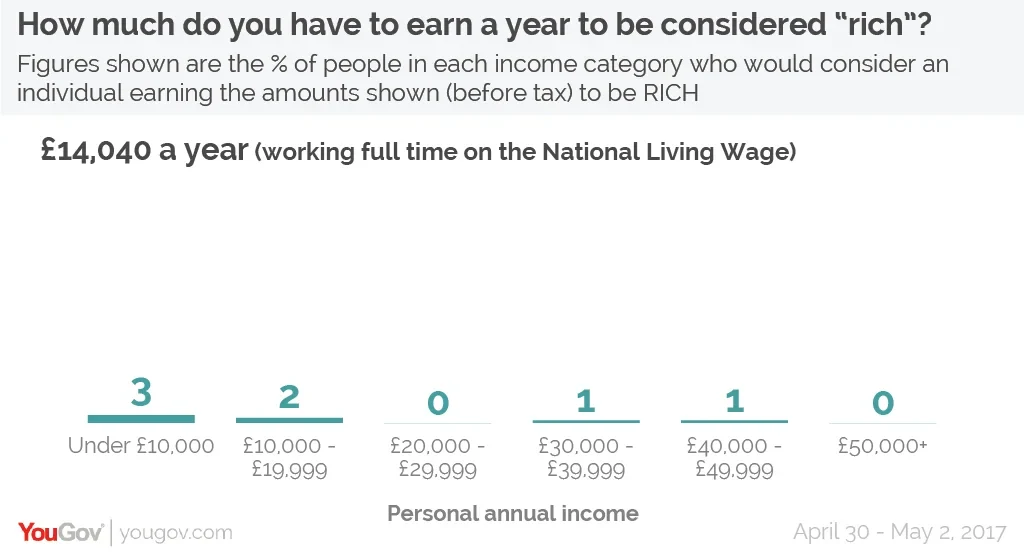Going in to the election Labour has put the point at which a person becomes “rich” at earning £80,000 a year. But how much does the British public thinks makes a person rich?
The Labour manifesto pledges that it would raise income tax on those earning £80,000 a year or more, should it form the next government. The shadow chancellor, John McDonnell, says the party was asking the 5% of Britons who would be impacted by such tax increases to pay a bit more towards public services.
When McDonnell initially suggested tax increases for the rich in late April, it prompted a public discussion about how much an individual needs to earn a year to be considered “rich” when he put the definition at £70,000-£80,000.
Understanding where the British public think that “rich” and “poor” lie on the income scale is obviously important, as Labour have identified, towards working out how best to set income tax policy (as well as, say, in-work benefits policy). But it can also tell us a lot about British society, which is why YouGov has explored the public’s views on where the lines for rich and poor lie.
How much money do you need to earn a year to be considered rich? And how little must someone earn to be considered poor?
When economists look at concepts around rich and poor, they will often talk about Britons in terms of “income deciles”. Simply put, they order the British public from those with the lowest incomes to those with the highest incomes and then divide the population into ten groups of equal size: the poorest 10% of people, the next poorest 10% of people, and so on until you get to the richest 10% of people.
Dividing up the public in this way means they can then tell you, for instance, what the average earnings of the poorest 10% of Britons are. YouGov asked the public whether or not a person earning the average amount in each income decile was rich, poor or neither.
Starting with those on the lowest income on the decile scale, the poorest 10% of Brits on average earn £8,600 a year. The research shows that 86% of Brits would say that earning that much means that you are poor, while just 6% would say they were neither rich nor poor.

By the time you hit the fifth income decile – those earning an average of £17,600 a year – the proportion of Brits thinking such a person is neither rich nor poor has overtaken the proportion who think they are simply poor (in this case, 55% and 33% respectively). At this point still only 3% of people would say someone earning this much money was rich.
It is not until you get to the tenth and final income decile – the richest 10% of Britons – that more people would say a person was rich than neither rich nor poor. Brits in this group make an average of £60,500, which is enough for 68% of people to say that they are rich.
Income milestones
Now, income deciles don’t mean much to most Brits. So on top of this YouGov also asked whether a person earning an amount equal to various financial milestones was rich, poor or neither.

Minimum wage: A person working full time on the minimum wage – or as it is now branded, the “National Living Wage” – and therefore earning £14,040 a year, is considered poor by 61% of Brits, and neither rich nor poor by 30% of Brits.
Living Wage: The “National Living Wage” is supposed to represent the minimum a person needs in order to get by in Britain, but many people dispute that it is enough. An alternative measure, calculated by the Living Wage Foundation and simply called the “Living Wage”, puts that figure at £16,478 a year. If a person were to be earning this amount annually, our results show that now only 41% of people would consider them poor, while 47% of people would consider them to be neither rich nor poor.
Average income: In 2015 the ONS calculated that the average annual income in the UK sat at £27,600. A person earning this much each year is overwhelmingly considered to be “neither rich nor poor” by the British public, at 72%. One in twenty Brits (5%) would consider such a person to be poor, whilst three times that figure (15%) would regard them as rich.
Higher (40%) taxpayers: Once a person’s income hits £45,001 they start paying the “Higher” tax rate of 40% on their earnings. Almost half (48%) of Brits say that someone in this tax bracket is rich. A further 41% would say that they are neither rich nor poor.
Additional (45%) taxpayers: The next and final tax bracket impacts those making £150,001 or more each year. This is known as the “Additional” income tax rate, and sees people paying tax of 45% on their earnings. Unsurprisingly, such individuals are seen as rich by the vast majority of Brits (86%, in fact).
How rich or poor do Britons consider themselves to be?
We also asked whether Brits considered themselves to be rich or poor. Overall, the majority (72%) think they are neither. Just over one in five Brits (22%) believe themselves to be poor, whilst just 4% think themselves rich. (A final 3% don’t know).
These are not objective measures of course – it may well be the case that many people who are technically poor do not consider themselves so because of the negative connotations associated with the term. In fact, the results show that only 37% of people earning less than £10,000 a year consider themselves poor (although this group will include pensioners and second earners with a wealthier partner).

What is perhaps more interesting here is that, although people become less likely to consider themselves poor the more money they make, they don’t really become much more likely to consider themselves rich. For instance, the proportion of people considering themselves rich rises from only 3% of those earning under £10,000 a year to 10% of those £50,000 a year or more.
This effect has been observed previously. In America, Richard Reeves, of the Brookings Institute, has described the “Me? I’m not rich!” problem whereby most people – even if they are making a lot of money – tend to think that they are not rich, and that the point where someone becomes “rich” is always at a higher earning level than they themselves are on.
The results of the survey bear this out. The higher an income someone is on, the less likely they are to say that earning a certain amount makes a person rich. For instance, while 74% of people with an income of £20,000-29,999 would consider someone on £60,500 a year to be rich, this figure falls to 56% of those whose annual income is £40,000-£49,999 and just 27% of those on £50,000+ a year.

Photo: PA








